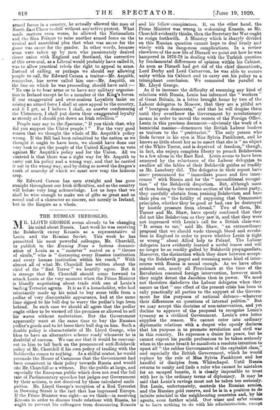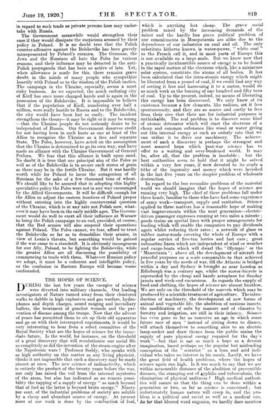THE RUSSIAN IMBROGLIO, 1VI R. LLOYD GEORGE seems already to be
changing his mind about Russia. Last week he was receiving the Bolshevik envoy Krassin as a representative of Lenin and the Russian Soviet. This week he has permitted his most powerful colleague, Mr. Churchill, to publish in the Evening News a furious denunci- ation of Lenin as a " monster " seated on a " throne of skulls," who is " destroying every Russian institution and every human institution within his reach." With almost all of what Mr. Churchill has written about the chief of the " Red Terror " we heartily agree. But it is strange that Mr. Churchill should come forward to attack Lenin at the very moment when the Prime Minister is blandly negotiating about trade with one of Lenin's leading Terrorist agents. It is as if a householder, who had reluctantly made up his mind to buy some trifle from a pedlar of very disreputable appearance, had at the same time signed to his bull dog to worry the pedlar's legs from behind. In such case we should all agree that the pedlar ought either to be warned off the premises or allowed to sell his wares without molestation. But the Government apparently want at the same time to buy the Russian pedlar's goods and to let loose their bull dog on him. Such a double policy is characteristic of Mr. Lloyd George, who likes to have an alternative scheme ready whenever he is doubtful of success. We can see that it would be conveni- ent to him to fall back on the pronounced anti-Bolshevik policy of Mr. Churchill if his own policy of trading with the Bolsheviks comes to no.thing. As a skilful orator, he would persuade the House of Commons that the Government had been consistent in their policy towards Russia and would cite Mr. Churchill as a witness. But the public at large, and especially the European public which does not read the full text of Parliamentary speeches but judges our Government by their actions, is not deceived by these calculated ambi- guities. Mr. Lloyd George's reception of a Red Terrorist in Downing Street is the fact that has impressed Europe. If the Prime Minister was right—as we think—in receiving Krassin in order to discuss trade relations with Russia, he ought to prevent his colleagues from denouncing Krassin and his fellow-conspirators. If, on the other hand, the Prime Minister was wrong in welcoming Krassin, as Mr. Churchill evidently thinks, then the Secretary for War ought to resign forthwith. A Ministry which is sharply divided on this Russian question cannot hope to deal firmly and wisely with its dangerous complications. In a review elsewhere of the new life of Disraeli we point out how he was hampered in 1876-78 in dealing with the Turkish question by fundamental differences of opinion within his Cabinet. As soon as Disraeli had got rid of the chief dis.sentients, Lord Derby and Lord Carnarvon, he was able to restore unity within his Cabinet and to carry out his policy to a triumphant conclusion. We commend the parallel to Mr. Lloyd George.
As if to increase the difficulty of resuming any kind of relations with Russia, Lenin has informed the " workers " of Great Britain, in a letter brought home by two of the Labour delegates to Moscow, that they are a pitiful set of " bourgeois democrats," and that he will despise them until they overthrow the Government by revolutionary means in order to unveil the secrets of the Foreign Office. Lenin in this precious document—obviously the work of a homicidal maniac—denounces the British Labour leaders as traitors to the " proletariat." The only person who finds favour in his eyes is Miss Sylvia Pankhurst, and he knows so little about her as to assert that she is " an object of the White Terror, and is deprived of freedom," though, in fact, she enjoys complete liberty to preach Bolshevism to a few aliens in the East End. Lenin seems to have been annoyed by the reluctance of the Labour delegates to swallow all the fables of their Bolshevik guides -as--leadily as Mr. Lansbury did. The delegates in their report have since pronounced for " immediate peace and free inter- course " with Russia said for the " unconditional recogni- tion " of the Bolshevik despotism. But, although most of them belong to the extreme section of the Labour party, they carefully abstain from praising Bolshevism and base their plea on " the futility of supposing that Communist principles, whether they be good or bad, can be destroyed by hostile pressure from abroad." Two of them, Mr. Turner and Mr. Shaw, have openly confessed that they did not like Bolshevism as they saw it, and that they were not impressed with Lenin's call for a British class-war. " It seems to me," said Mr. Shaw, " an extraordinary proposal that we should wade through blood and revolu- tion in England in order to prove whether Lenin is right or wrong " about Allied help to Poland. The Labour delegates have evidently learned a useful lesson and will no longer be so readily gulled by Bolshevik propagandists. Moreover, the distinction which they draw between accept- ing the Bolshevik gospel and resuming some kind of inter- course with Russia is sound enough. As we have often pointed out, nearly all Frenchmen at the time of the Revolution resented foreign intervention, however much they might detest the Jacobins then in power. We need not therefore disbelieve the Labour delegates when they assure us that " one effect of the present crisis has been to rally practically all parties to the support of the Govern- ment for the purposes of national defence—whatever their differences on questions of internal polities." But we may accept this doctrine of non-intervention, and yet decline to approve of the proposal to recognise Lenin's tyranny as a civilized Government. Lenin's own letter supplies the reason. We cannot enter into ordinary diplomatic relations with a despot who openly declares that his purpose is to promote revolution and civil war in this country. He expresses a desire for peace, but he cannot expect his pacific professions to be taken seriously when in the same breath he manifests a resolute intention to upset all " the robber Governments of the capitalist class," and especially the British Government, which he would replace by the rule of Miss Sylvia Pankhurst and her handful of disciples from Whitechapel. Until Russia returns to sanity and finds a ruler who cannot be mistaken for an escaped lunatic, it is clearly impossible to treat with her in the ordinary terms of diplomacy. It may be said that Lenin's ravings must not be taken too seriously. But Lenin, unfortunately, oontrols the Russian armies, and the Russian gold reserve, and he is in a position to do infinite mischief in the neighbouring countries and, by his agents, even further afield. Our wiser and safer course is to have nothing to do with his administration, except In regard to such trade as private persons here may under- take with Russia.
The Government meanwhile would strengthen their case if they would dissipate the suspicions aroused by their policy in Poland. It is no doubt true that the Polish counter-offensive against the Bolsheviks has been gravely misrepresented by Poland's enemies. The Germans, the Jews and the Russians all hate the Poles for various reasons, and their influence may be detected in the anti- Polish propaganda that has been so active of late. Yet, when allowance is made for this, there remains grave doubt in the minds of many people who sympathize heartily with Poland as to the wisdom of the Polish tactics. The campaign in the Ukraine, especially, seems a most risky business. As we expected, the much enduring city of Kieft has once more changed hands and is again in the possession of the Bolsheviks. It is impossible to believe that if the population of Kieft, numbering over half a million, were really hostile to Russia and to the Bolsheviks, the city would have been lost so easily. The incident strengthens the theory—it may be right or it may be wrong —that the Ukraine people do not seriously desire to be independent of Russia. Our Government deserves credit for not having been in such haste as one at least of the Allies to recognize the Ukraine as a free and separate State. The Poles, however, have acted oh the assumption that the Ukraine is determined to go its own Way, and have made an alliance with the Ukraine Government of General Petlura. We fear that this alliance is built upon sand. No doubt it is true that one principal aim of the Poles as well as of the Bolsheviks is to secure such stores of grain as there may be in the fertile Ukraine. But it was hardly worth while for Poland to incur the antagonism of all Russians for the sake of a few thousand tons of wheat. We should like to be assured that in adopting this highly speculative policy the Poles were not in any way encouraged by the Allied Governments. It will be difficult enough for the Allies to adjust the eastern frontiers of Poland proper without entering into the highly controversial question of the Ukraine, which is at any tate not Polish now, what- ever it may have been in the early middle ages. The GoVern- inent would do well to exert all their influence at Warsaw to bring the Polish campaign to an end, provided, of course, that the Red armies will also suspend their operations against Poland. The Poles cannot, we fear, afford to trust the Bolsheviks so far as to demobilize their armies, in :view of Lenin's threats, but something would be gained if the war came to a standstill. It is obviously incongruous for our Ally, Poland, to be fighting the Bolsheviks, while the greater Allies are all discussing the possibility of commencing to trade with them. Whatever Russian policy we adopt, it must be a coherent and intelligible policy, or the confusion in Eastern Europe will become worse confounded.







































 Previous page
Previous page